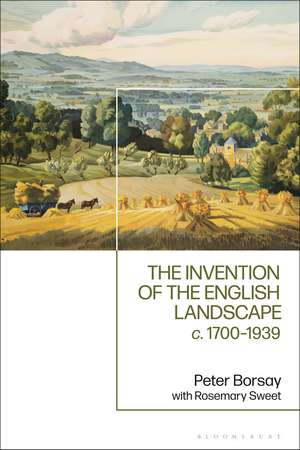The Invention of the English Landscape: c. 1700-1939
Autor Professor Peter Borsay, Rosemary Sweeten Limba Engleză Hardback – 23 aug 2023
Preț: 512.15 lei
Preț vechi: 732.22 lei
-30% Nou
Puncte Express: 768
Preț estimativ în valută:
98.01€ • 101.95$ • 80.91£
98.01€ • 101.95$ • 80.91£
Carte disponibilă
Livrare economică 24 martie-07 aprilie
Livrare express 08-14 martie pentru 121.45 lei
Preluare comenzi: 021 569.72.76
Specificații
ISBN-13: 9781350031678
ISBN-10: 1350031674
Pagini: 304
Dimensiuni: 156 x 234 x 20 mm
Greutate: 0.6 kg
Editura: Bloomsbury Publishing
Colecția Bloomsbury Academic
Locul publicării:London, United Kingdom
ISBN-10: 1350031674
Pagini: 304
Dimensiuni: 156 x 234 x 20 mm
Greutate: 0.6 kg
Editura: Bloomsbury Publishing
Colecția Bloomsbury Academic
Locul publicării:London, United Kingdom
Caracteristici
Is the first book to trace the development of the natural English landscape into a tourism and leisure resource and demonstrate how this changed the geography of the nation
Notă biografică
Peter Borsay was Professor of History at Aberystwyth University, UK, a member of the advisory boards of Urban History and the Journal of Tourism History, and a committee member of the British Pre-Modern Towns Group. His books include The English Urban Renaissance (1989); The Image of Georgian Bath, 1700-2000: Towns, Heritage and History (2000); and A History of Leisure: the British Experience since 1500 (2006). He has co-edited Resorts and Ports: European Seaside Towns since 1700 (2011) and Leisure Cultures in Urban Europe, c. 1700-1870: a Transnational Perspective (2016).Rosemary Sweet is Professor of Urban History and Director of the Centre of Urban History at the University of Leicester, UK. She is the author of The English Town, 1680-1840 and The Writing of Urban Histories in Eighteenth-Century England.
Cuprins
Introduction Part I: Before the Victorians: c. 1500-1837 1. Revealing the Early Modern Landscape 2. Ideas and Representations 1500-1837 Part II: Reconfiguring the Landscape 3. Ideas and Representations 1837-1939 4. New Topographies 5. Timescapes Part III: Economic and Social Change 6. Economic and Social Change 7. The Transport Revolution Part IV: The State, Politics and Identities 8. State, Place and Politics 9. Identities and Experiences Conclusion: The Second World War and Beyond Bibliography
Recenzii
A masterly work- wide-sweeping, provocative, readable- by one of Britain's leading cultural historians. Peopled with poets and novelists, antiquarians and fossil collectors, churchmen, hack journalists, artists and composers ( Elgar, Butterworth, Vaughan Williams) , Borsay's book recounts the story of the imagining and reimagining of England's landscape, as the nation was transformed by industrial urbanisation and the insatiable rise of London, the transport revolution, Romanticism, and the racist snobbery of Empire.
Researched and written at a time when the ecological, economic and cultural value of land is being irresistibly reimagined, it testifies to humanity's enduring attachment to landscape, and the fascination and alarm that has historically accompanied its transformation.
Rich, intricate, enchanting, jam-packed with information, at times surprising and at times eccentric: this book is a must for all lovers of the English countryside. Peter Borsay, with the sympathetic editorial aid of Rosemary Sweet, here presents his masterpiece.
A splendid memorial to the late Peter Borsay, expertly edited and completed by Rosemary Sweet, this book emphasises the role of imagery, myth and imagination in inventing the English landscape. Chronologically wide-ranging, consistently thought-provoking, and attentive to urban as well as rural contexts, it is a hugely satisfying read.
Researched and written at a time when the ecological, economic and cultural value of land is being irresistibly reimagined, it testifies to humanity's enduring attachment to landscape, and the fascination and alarm that has historically accompanied its transformation.
Rich, intricate, enchanting, jam-packed with information, at times surprising and at times eccentric: this book is a must for all lovers of the English countryside. Peter Borsay, with the sympathetic editorial aid of Rosemary Sweet, here presents his masterpiece.
A splendid memorial to the late Peter Borsay, expertly edited and completed by Rosemary Sweet, this book emphasises the role of imagery, myth and imagination in inventing the English landscape. Chronologically wide-ranging, consistently thought-provoking, and attentive to urban as well as rural contexts, it is a hugely satisfying read.
